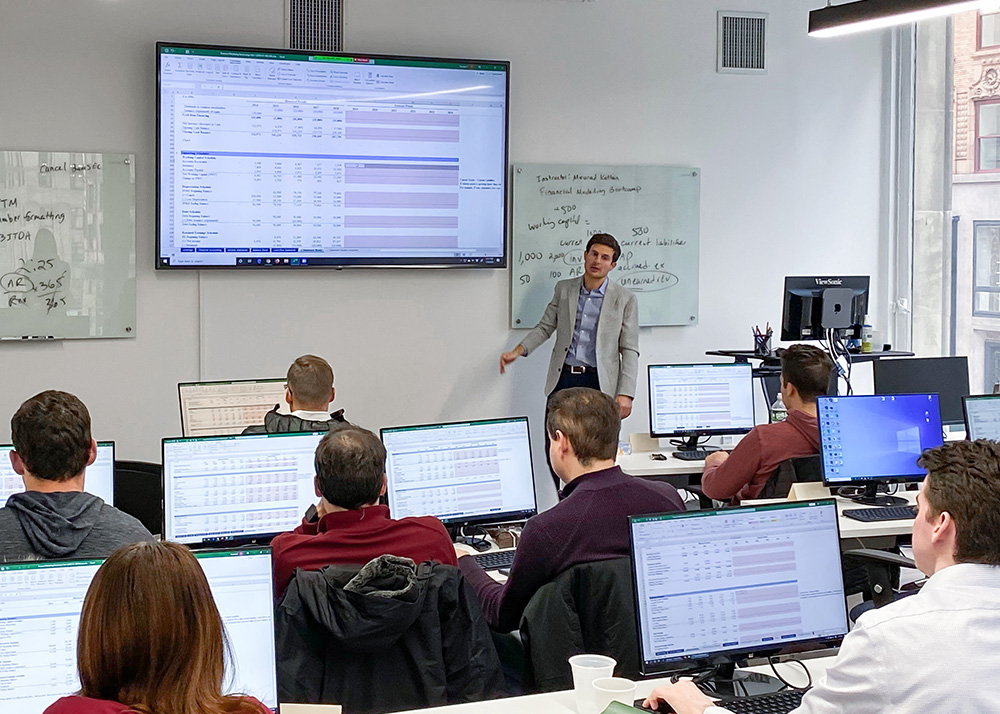What is Data Science?
The world revolves around data, and that data would mean nothing without professionals who could make sense of it through organization and analysis. Data Science is a field that combines math, programming, statistics, and other academic fields to gain knowledge and insights from collected data. Data scientists are responsible for categorizing data, creating algorithms and models to parse through data, and making predictions based on patterns or repeated behaviors. In today’s highly digital world, there are a variety of tools and software that can help make data science more efficient. Programs like Tableau, PowerBI, and Infogram can take a collection of data points and turn them into easy-to-read diagrams, plots, or visual aids. Data science is used in many industries, but can most commonly be found in banking & finance, marketing & advertising, and retail & manufacturing. With the information that scientists get from their data, recommendations, and predictions can be made to help with informed decision-making.
The history of data science goes back to the 1960s. The term was created to reference those who could make sense of the large amount of data being collected by new technologies. Because data science consists of many science, technology, engineering, and math (STEM) related fields, it has no one creator. However, many outstanding pioneers can be credited with developing data science as a profession, and as a genuine field of learning. From Ronald Fisher, the father of modern experimentation, to Alan Turing, a World War II-era intelligence agent credited with the development of computer science and artificial intelligence, key figures have played a role in data science evolving into the field we know today. In 1962, John Tukey wrote a paper called The Future of Data Analysis, which outlined the rapidly changing relationship between statistics and computers. This was followed by the direct use of the term “Data Science” in a 1974 publication by Peter Naur regarding data and data processes, and their use in handling and building models.
Today, data science is a valuable tool for learning more about how people interact with the world around them. Business, Information Technology (IT), and Data Science managers work together to tackle problems and establish an analytical method to finding solutions. Whether developing the infrastructure to manage data, or ensuring that data-related projects meet their deadlines, there are many moving parts to data analysis, and with the help of programs and applications, data science allows those parts to move together. If you want to learn more about an important and rapidly growing area of technology, we’ll review why learning data science is a valuable tool to have in your portfolio as you move into higher education and eventually, the working world of computer science.
Why Learn Data Science?
There are plenty of reasons to join the field of Data Science. As a skill that is in demand and part of a growing industry, learning data science can provide you with professional opportunities in some of the world’s leading industries, including education, healthcare, transportation, and even media and entertainment. The amount of data acquired in today’s digital age can be overwhelming and incoherent. Data scientists are not only needed to make sense of that data, but they also assist in solving problems and helping institutions make informed decisions that match their goals and objectives. With such a wide range of uses, Data Science is a safe choice for those who may not be completely sure of which industry they want to join, or what career path works best for them.
Professional uses for Data Science aren’t limited to the field of technology. The benefits of data science can be felt across all industries, where there is a rapidly increasing demand for data analysis. Companies want to learn more about human behavior so that they can make effective business decisions. In fact, research has shown that 76% of businesses plan to increase their spending on data analytics over the next two years. Retailers use data analytics to pinpoint what their customers are looking for in a product or a shopping experience. Points are grabbed from surveys, feedback, and shopping trends to get a better idea of how their business compares to the competition. In healthcare, data science is vital in tracking patient statistics and clarifying general health trends. This information can then be used to improve patient care. Banking or finance-related fields use data to both serve customers and provide them with applications and software that can enhance their experiences. For example, banks have used predictive analysis to create virtual assistants that can help customers pay bills and view transaction history. Data science can inform decision-making in nearly any field, and data scientists are capable of taking numbers, facts, and figures, and turning them into coherent observations that others can easily understand.
Data Science can also be used in personal projects. Used alongside programming languages, you can build a model application that detects fake news stories, a website that shows movie and TV show recommendations, and even software that recognizes emotions from speech patterns. If you’re interested in Artificial Intelligence, you can build and converse with chatbots, or use them in portfolios or on personal websites. Data science is one way to learn more about the communities that you’re a part of. Whether that’s collecting opinions on popular clothing and sorting through them, or gaining more demographic information about the fandoms you’ve joined, data science is the perfect blend of STEM and technology. You can use the data you collect to start your own business, social media, or platform. You can also monetize your data by selling that data directly, launching a data marketplace, or listing your data and making it accessible to other audiences. Joining data science can greatly increase your general opportunities in the world of technology.
What Will You Learn in a Data Science Summer Program
Data Science summer programs are an immersive experience. They cover all the fundamentals needed to confidently join the field of data science. Most often, they are geared towards grade school and high school students who have an interest in learning about data collection and sorting. In a beginner or basic-level course, students will learn statistical analysis, machine learning, and data visualization. Through hands-on learning and projects that replicate the real-world use of data, those who complete a summer program are more prepared to transition to the professional workforce or STEM-related paths in higher education. By participating, students can gain valuable technical skills that are essential for success in data-related positions. With the help of data science, you will be equipped to handle complex challenges in various fields.
Depending on the summer camp, you may learn different topics. Many cover a handful of minimum skills such as programming languages like Python or Java, data manipulation, and data management techniques. Because data science is a STEM-related field, you will learn how to use science, technology, and math to detect patterns and solve problems related to data. Higher-level programs will delve deeper into new topics like the influence of data on artificial intelligence and deep learning. Depending on your proficiency and previous experience with data, there are available summer programs that can accommodate learners who have already learned basic things like statistics, computing, data wrangling, or data structures, by introducing them to a broader range of topics and more in-depth projects.
Summer programs offer participants a unique way to learn data science. They often provide a collaborative learning environment where you can exchange ideas and learn from each other’s experiences. Unlike self-learning, these programs encourage participation by building a network of experienced and learning data scientists, and providing them with hands-on projects that take their knowledge of data from theory to practice. Through group work, you can improve your critical thinking and problem-solving skills in a group setting. You will leave a program with many valuable connections that can be leveraged as you move into the workforce.
What Can You Do with Data Science Training
In today’s digital age, the possibilities for how to use data science are endless. Many career opportunities require data-related skills, as the demand for data science has grown and will continue to grow through 2031. Some jobs are directly related to data, such as data architect, engineer, or analyst. Another job that’s data-dependent is a statistician, or someone who works closely with organizations to collect, analyze, and interpret data. Machine learning, which is also a big part of data science, employs skilled professionals in roles like machine learning engineer, and machine learning scientist. There are also unique job opportunities in other industries that require data science skills. These industries include healthcare, retail, entertainment, and transportation, all of which regularly hire professionals to help make data-driven decisions. The salaries of in-demand data science jobs are generally higher than the national average salary, and they may require previous experience or formal training, which could be a degree, certificate, or general program.
Projects related to data science and analytics are varied. You can work directly with businesses to create financial reports, analyze economic trends, and optimize revenue by helping companies make data-based decisions. You can also provide them with feedback on customer habits, internal finances, or business predictions. Other innovative projects can be more personal, such as data analysis to help with social and environmental challenges, like using data to help advocate for those in poverty or experiencing inequality. In the world of healthcare, data is used to change patient care and to improve the analysis of medical research. Data Scientists regularly analyze patient data to identify patterns that may help improve medical outcomes or better serve the population. Overall, the applications of data science are important to a wealth of industries, and you may find yourself working on many unique projects that improve the experience of professionals and non-professionals alike.
If you are interested in following a degree track for data science, there are many graduate and undergraduate options. Computer Science is a commonly related degree and expands data analysis to other areas of technology like programming languages, computer networks, and software engineering. Other popular degrees include Information Technology, Applied Mathematics, Statistics, and even Business and Finance. There are direct degrees in data science and data analytics. Advanced degrees are offered in Artificial Intelligence, Machine Learning, Business Analytics, Data Science, and more. When choosing a degree, it is important to consider your overall professional goals, and which skills allow you to reach those goals. Many data science summer programs are sponsored by universities and institutions that will offer related degrees or internships once you have fully transitioned to higher education. Building those connections early can help with educational opportunities down the road.
Advantages of a Data Science Summer Program
There are many advantages to learning data science through a summer program. With the structured learning environment, these programs provide a collaborative space to learn data science, guided by professionals who will make sure that you are prepared to take future steps in the field. While there are other options for learning data science, such as self-learning or traditional classes in school, a summer program is often built around interactive learning and will use a combination of hands-on group work, technical projects, guest speakers, and other exciting elements to help you gain proficiency fast in data and data-related skills. Summer programs are shorter term than traditional classes and are intentionally scheduled during summer so as not to interrupt their formal education. Because of this, they can be taken as a supplement to school classes to build confidence and provide you with practice even when school is not in session.
Another advantage of a data science summer program is the exposure to real-world projects and industry insights. It is not uncommon for these programs to incorporate actual data sets from various places. Certain programs will even provide a direct connection to specific companies or businesses, and they will help you build a relationship that can carry you through to your professional career. With internships and networking opportunities, a summer program is the perfect place to build your technical skills with valuable insights that can only be gained through field trips, institutional visits, and other firsthand experiences with businesses that regularly use data in their planning. Professional development opportunities look great on a resume or a professional profile, and for those summer programs that offer certificates of completion, they can be used as an endorsement of your skills in future job interviews.
Ultimately, it’s the combination of structured learning, hands-on experience, and collaborative work that make summer programs so valuable. Once you have developed the fundamentals of data science, you can use that knowledge to improve your educational journey by working directly with math and technology, even in your time off of school. Knowing more about how data is collected, analyzed, and communicated to other people has a multitude of uses in any educational setting.
Best Data Science Summer Programs for High School Students
If you are looking for a dynamic summer program, NextGen Bootcamp offers a Python Data Science and Machine Learning program for high-school students, where you can learn Python specifically for data science and machine learning. Python is one of the most popular programming languages used in computer science today and is an incredibly valuable skill to have alongside data science. As you learn more about programming tasks, you will then transition into the data science and machine learning portion of the course which introduces you to packages like Pandas, Matplotlib, and SciKit-Learn which will help you manage data. You can work on real-world projects under the guidance of an experienced instructor to strengthen your analytical skills. This course is great for beginners who have a strong interest in coding and are looking to expand that knowledge in a project and lecture-based environment. This program is available in a live online format for those who want additional flexibility.
Quinnipiac University hosts a Data Science Lab summer program for those who want to expand their data science knowledge while also improving their critical and creative thinking skills. This course uses technology to tackle real-world data-related problems, using a combination of math, statistics, and computer programming to make sense of various sets of data. By the end of the course, participants will have a functioning knowledge of Big Data, as well as confidence in data science theory and methodology. They will also use data sets to learn more about patterns and problem-solving for use in professional settings. Quinnipiac’s program provides organized, community-based field trips to help build relationships and strengthen networking outside of the course.
Harvard offers an Introduction to Data Science with a Focus on Visualization summer pre-college course. This course teaches data science through Python and shows students how to put together data sets from web pages. With the help of Matplotlib, students can create visualizations, which will then take them into a separate section of the course that focuses more on the potential uses of visualizations in real-world scenarios, using COVID-19 infection data as the basis. Students will have access to JavaScript training and will gain hands-on experience with computational analysis. There are activities in web scraping and data cleaning, and opportunities to do general work in computer programming. This highly collaborative environment uses teamwork and group activities to turn technical knowledge into practical knowledge, and students will leave the course with experience in creating visualizations and presenting their findings.
Carnegie Mellon University has a Pre-college program in computer science, which covers foundational computer analysis skills. These analytical skills are necessary for those who want to enter the field of data science. The curriculum reviews basic programming skills through Python, including data structures like lists and dictionaries, problem-solving techniques like algorithmic thinking and debugging, and a pre-concepts math course. Through a variety of collaborative activities, students will work on projects that are presented to both peers and instructors, building confidence in their presentation skills, and allowing them to showcase their work. There are plenty of opportunities to talk about the field of computer science with some of Carnegie Mellon’s faculty, and other industry leaders.













